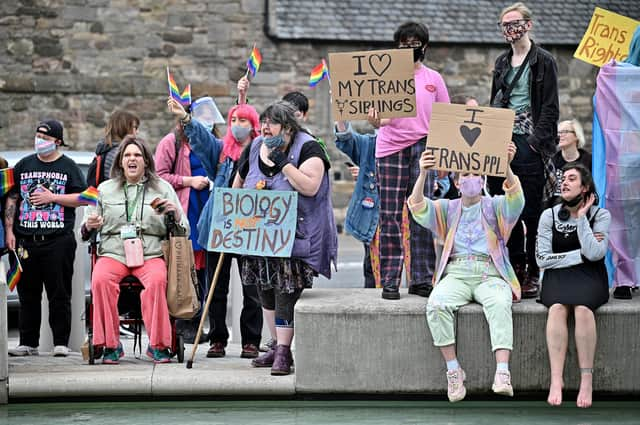Transgender debate in Scotland: Like anyone, trans people deserve the freedom to live as our true selves – Vic Valentine


The report details what the committee, made up of seven MSPs from the SNP, Scottish Conservatives, Scottish Labour and Scottish Greens, think of the evidence they have gathered since March this year, and whether they would recommend that all MSPs should support the Bill’s general principles when asked to vote in less than two weeks, on October 27.
The short version is: the committee supports the Bill. They recommended by a large majority – five to two – that MSPs should vote for it. The five MSPs in support came from the SNP, Labour and Greens – all of whom, alongside the Scottish Liberal Democrats (who don’t have a member on the committee) have manifesto commitments to reform the Gender Recognition Act.
Advertisement
Hide AdAdvertisement
Hide AdBut what’s in the Bill, and why does it matter to trans people? I have written about these issues before, but understandably it’s not something everyone knows lots about.
The Bill would reform the Gender Recognition Act 2004, which sets out in law the process by which trans men and women can apply for a Gender Recognition Certificate. A GRC, in the crudest terms, is like a “voucher” that you use to update the sex on your birth certificate.
And why does this matter? Many trans people live our lives for a long time feeling like something doesn’t quite fit, a constant sense of pressure that can build up over many years.
When you’ve spent so much of your life feeling that pressure, understanding that your gender isn’t what you thought it was can feel like something just clicks. Like you can finally breathe a little easier. And one of the steps most people take once things have fallen into place is updating our identity documents – so that they tell the facts of who we are today, not who we were expected to be.
Without getting a GRC, on the rare moments when you have to use your birth certificate, a trans man or woman will have to show something where that ‘F’ or ‘M’ does not reflect who they are, making important moments in life fraught with worry and difficulty.
We all want to be accepted and supported as who we truly are at these moments – times like starting a new job, or giving notice to get married. But instead, many trans men and women have to navigate these milestones with a great deal more difficulty than others, because the current process for getting a GRC is so intrusive, demeaning, and stressful, that many don’t apply for one.
Currently, to get a GRC you must submit evidence to a tribunal of doctors and judges who never meet you that you are “living in the other gender”, and they determine if you can be legally recognised.
This includes two types of medical evidence – a psychiatric diagnosis of gender dysphoria, and a report explaining your choices about medical transition (such as whether to take hormones, or have any gender affirming surgery).
Advertisement
Hide AdAdvertisement
Hide AdThe second of these is needed even though there is no requirement to have undergone any treatments in order to get a GRC. You must also have been "living in the other gender” for at least two years, and provide evidence of this. This is a much more complex and medicalised process than the ones used by trans people to update all of our other identity documents.
The Bill proposes that instead of a process that requires you to provide lots of evidence to a tribunal, you should instead be able to “self-declare” that you are living as a man or a woman.
This means that the process, as it does now and has since 2004, will require you to sign a statutory declaration, which is a legal oath, saying you are living permanently as a man or woman and intend to for the rest of your life.
Making a deliberately false declaration would continue to be a criminal offence. However, the process will no longer require the medical and other evidence alongside this. You’ll also be able to apply after three months living fully in your gender, rather than two years, and 16 and 17-year-olds will be able to apply too, in line with the age at which they obtain many other legal rights.
And what did the committee think of these changes? The majority supported them all. After taking written evidence with more than 11,000 responses. After nearly 40 people, with a range of views from strong support for the Bill to strong opposition, made their case at formal evidence meetings.
After reviewing the results of two public consultations, done in 2017-2018 and 2019-2020. After hearing that the bill is welcomed by, amongst others, the Scottish Human Rights Commission, the Children and Young People’s Commissioner, Amnesty International and a United Nations’ independent expert.
After looking at international best practice in this area, with more than 30 countries, states and territories around the world with laws like this in place already. And most importantly, after hearing from trans people ourselves about how making this process simpler and fairer would remove one of the main barriers we face in law to being recognised as who we truly are.
We all deserve to have the freedom to live as our true selves. So I hope that on October 27, MSPs from across the chamber will vote for the Gender Recognition Reform (Scotland) Bill at stage one because, by doing so, they have the opportunity to take us much closer to that being as true for trans people as it is for everyone else.
Vic Valentine is manager of Scottish Trans
Comments
Want to join the conversation? Please or to comment on this article.
